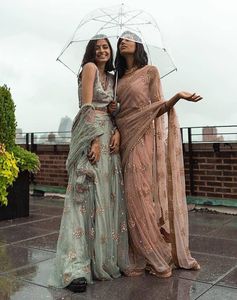So all the young folk and the queer folk in my life are very upset at the break of long-time lesbian lovers Anjali Chakra and Sufi Malik. For those who came in late (like me) Anjali is a Hindu from India, and Sufi is a Muslim from Pakistan. They live and work in the US and shot into the limelight in 2019 when their pictures (dressed in traditional desi attire and laughing under an umbrella in the rain) went viral on the internet. And recently, everybody swooned collectively when Sufi went down on one knee, dressed in a beautifully tailored white pantsuit, and proposed to Anjali at the ‘very tippy top’ of the Empire State Building. And why not? These are gorgeous young women (Sufi is all twinkly-eyes and slight, elfin charm, while Anjali is a large-eyed, long-tressed stunner) who broke barriers of gender, religion and politics, all in one shot. Naturally, they captured our imaginations and our hearts and seemed to be living the happy ending we all crave. So what went wrong with Anjali and Sufi?
Their carefully coordinated posts on social media spoke of infidelity (committed by Sufi, devastating Anjali), but of course it goes much deeper than that. I am guessing their relationship deliquesced under the white hot heat of the very same viral wave they rode on to popularity. And unlike Sania Mirza and Shoaib Malik, another hugely popular Indian-Pakistani couple who broke up recently, their chief accomplishment is their relationship itself. They don’t play tennis, or cricket. One is an artist and the other works in the health care sector; they are pretty much just starting out. It is terribly sad, and these girls probably didn’t know what they were getting into. When your love story starts getting recorded and lapped up daily by consumers it slowly gets leached of all spontaneity, and becomes calculated, rehearsed, agonised over and acted out cynically with one eye on the watching audience. Basically, a love story devoid of all love.
Living your ordinary day-to-day life in the public eye is nightmarishly difficult. Ask Kate Middleton. When you allow (even your own) cameras into your daily life, your marriage proposals, your baby births, and your most trusted spaces, you leave yourself with no place to escape to. Life becomes the Bigg Boss House, and all you can do is to fight to not get vacated. In the BC (before there was a camera in every phone) era these were issues only celebrities faced. But now, each and every one of us is a mini-celebrity, constantly locked in a battle to look as pretty in real life as we look in our display pictures. Everything is a projection, everything is for an audience, nothing is real. We don’t have experiences anymore. We merely record the projection of an experience, showcasing what we think one is supposed to be feeling when one has an experience of that sort.
If you watch films from Karan Johar or Sooraj Barjatya, you’ll see Amitabh Bachchan or Alok Nath playing a powerful business tycoon who loves his joint family. Then, on the news, you’ll see an actual powerful business tycoon, dancing to the songs of those films at his family functions. The tycoon is trying to behave like the actor, who was trying to behave like the tycoon. In a gangster flick, an actor is trying to ape a gangster, who was anyway trying to ape an actor. In an army film, an actor is trying to copy a commando, who was trying to copy an actor.
It is like two mirrors placed in front of one another, reflecting virtual images all the way to infinity. Nothing is authentic. The answer? Protect your private spaces fiercely, and get yourself a camera-less phone.
editor@theweek.in


